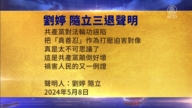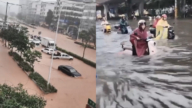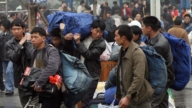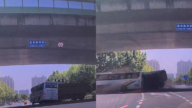【新唐人2014年08月19日讯】“农民日常饮用‘一杯干净水’,起码免于受到最直接健康损害的最基本要求,也只是一个奢望。”这是中国非政府组织“创绿中心”,在日前发表的报告中的一句话。中国为经济增长付出的环境成本前所未有,然而越治理却越污染。我们访问到在国内多年担任环境管理官员的专家,为您揭示不为一般人所知的原因。
“创绿中心”的“一杯干净水项目”,到去年末为止,共调研了大陆96个村庄和学校。在这份报告中,他们特选72个村庄和6个农村地区的学校进行分析,发现农村饮水环境令人担忧。
报告显示,调研村庄一半以上有饮水问题,地表水水源变的越来越少,随着水源受到污染问题日益严重,而民众的饮水方法,基本是不经处理。有些村庄村民多发口腔疾病、结石疾病、皮肤病等,也不能排除与饮用水水质差有关联。
而调研村庄饮水的最主要污染源,是工业污染,以及养殖业、垃圾场等。另外,由于饮水管道没有维护等原因,农村地区小学的孩子们直接喝生水,有很大风险。
实际上,饮用水安全问题,还不只是在农村,去年就有报导说,“中国一半城市的饮用水不合格”。今年3月,环保部又说,“中国2.8亿居民使用不安全用水”。中国的水污染问题为什么长期治理,却越治理,越污染呢?
在国内担任多年环境管理官员的高博士,向《新唐人》揭示了一个鲜为人知的环保体制上原因。
前中国环境管理官员高博士:“其实中国的环境保护的目地,开始就是不对的。不是为了真正的人的生活,而是为了秩序稳定的经济发展。那么在治理手段上,它也是同样考虑经济发展的问题。所以它在治理过程当中,有一个‘征收排污费’的问题。实际上这个‘征收排污费’,不是在给企业增加压力,不能够排放污染物,而是政府在卖环境资源。环境保护部门,在这个过程当中,它在挣钱。”
“创绿中心”的报告,也建议地方政府,应当改变“重政绩”为“重质量”,做好勘探、设计以及工程监理工作。高博士披露,中共对地方官员的考核标准中,的确有一个“环境项目”,而且还是“一票否决权”。也就是说,即使其他项目都达到标准,只要“环境”这一票不合格,其他成绩都算零。
高博士:“我们搞环境保护的时候,实际监测之后,实际上这个城市的环境质量很差。但是为了考虑到这个城市的考核,市长的考核,我们另做一套数据。那是达到标准的数据。然后把这个数据交给往上,往省,往国家上报。这样的话,表面上看起来,这个城市,这个农村,这个地区的环境,是每年每年,越来越变好。”
高博士指出,不仅环保数据是“内行看门道”,连政府治理排污企业的数据,也是。例如,甘肃省曾经由于治理排污,关闭了100多家企业。
高博士:“100多户,但是都是小型的企业。甚至有些根本是挂着名字,实际上没有生产的企业,关掉了。那个整个100多个企业加起来,都没有甘肃省一个叫‘白银有限公司’的企业,它污染重。那么为什么不关闭这个工厂呢?因为这个工厂,它是整个县的纳税大户。”
环保部门靠环保赚钱;地方官员靠假数据搏政绩﹔政府所谓“大力治理”,结果却只是数字“看起来很美”。
高博士:“按照现在的中国环境保护的方法,或者中国现在整个国家的运行机制的话,它是污染治理不了。因为它这个整个国家,以经济发展为主这个不改变的话,它是不可能的。所以要想改变这个状态,整个国家的运行机制都得改过来,还是要以人为主才能行。”
“以人为本”,就是饮用水不再只是数据过关。浩浩长江漂着死猪,监测数据都能达到饮用水标准,但高博士说,这样的水,不能喝。
采访编辑/尚燕 后制/李勇
It’s A Luxury to Drink a Glass of Clean Water
“Farmers’ fundamental need to drink a glass of clean
water in their daily lives so as to get rid of the most direct
damage to their health remain luxurious wishes" is a sentence
in a report recently published by NGO Greenovation Hub China.
China has paid an unprecedented environmental cost for its
economic growth, but the more it does, the more serious
the pollution is.
We have interviewed some experts who have dealt with the
environmental governance in China for years, and they
reveal some reasons that are unknown to the average person.
As of the end of last year, Greenovation Hub’s One Glass of
Clean Water Project has conducted a survey in a total of 96
villages and schools in China.
In this report, 72 villages and six schools in rural areas were
selected for analysis, and they found that the drinking water
environment in farming villages is worrisome.
The report shows that more than half of the villages surveyed
have drinking water problems.
The sources of surface water have become less and less.
Though the pollution in the sources has become worse and worse,
the drinking water used by the general public is basically
not treated.
In some villages, most villagers have oral diseases, stone disease,
skin diseases, etc.
We cannot rule out the possibility that they are linked
to the poor quality of drinking water.
The main sources of drinking water contamination in the
villages surveyed are industrial pollution, garbage dumps,
aquaculture, etc.
In addition, due to a lack of maintenance on drinking water
pipelines and other reasons, it’s very risky for elementary
school pupils in rural areas to drink unboiled water directly.
In fact, the problems with drinking water safety do not exist
in rural areas alone.
It was reported last year that half of the major cities in China
failed to meet drinking water standards.
In March this year, the Ministry of Environmental Protection
indicated “Over 280 million people in China are using unsafe
drinking water."
Then why are China’s water pollution problems getting more
and more serious though they have been dealt with for a long time?
Dr. Gao, a former official who worked on environmental
management in China for many years, revealed an
environmental institutional reason to NTDTV.
Dr. Gao: “In fact, the objectives of China’s environmental
protection were wrong at the outset.
They were not really for people’s lives, but for stable economic
development.
The management approaches they took into consideration
were also focused on economic development issues.
As a result, during the process of management, there was a
problem of the pollution charge.
In fact, this pollution charge was not intended to pressure
enterprises not to discharge pollutants.
It was for the government to sell environmental resources,
and it was for environmental protection agencies
to make money during the process."
In its report, Greenovation Hub also suggested that local
government should transform their performance-oriented
mentality into quality-oriented mentality so as to do a good job
in assessment, design and construction supervision.
Dr. Gao disclosed that there is surely an item for environmental
protection in Chinese evaluation criteria for local government
officials, and it’s an “absolute veto."
In other words, even if other items are up to par, their score
would be considered zero so long as the environmental
protection item failed.
Dr. Gao: “When dealing with environmental protection affairs,
though the monitored environmental quality of a city was
very poor, we made up another set of data that were up to
standards, as we took into account the evaluation of the city
and that of the mayor.
Then we submitted the data to our superior authorities,
including the provincial and central governments.
By doing so, the environment protection in this city, village
or region would seem to be better and better
every year on the surface."
Dr. Gao pointed out that not only did the data on environmental
protection have problems, but even those on enterprises that
emitted pollutants were also falsified.
For example, the number of factories that were shut down
due to sewage treatment problems in Gansu Province was once
as high as over 100.
Dr. Gao: “All of these 100-plus factories were small businesses,
and some of them were even simply virtual companies without
any production records.
The aggregate pollution of these 100-plus factories was not
as serious as that of a company in Gansu Province by the name
of Baiyin Nonferrous Metals Company.
Then why was this plant not closed?
It was because this plant is the biggest taxpayer in the county."
Environmental protection agencies make money
by mean of environmental protection.
Local government officials gain their performance evaluation
by falsified data.
The government’s so-called “strong governance" turns out
to be nothing but falsified data that looks good.
Dr. Gao: “Based on China’s existing environmental protection
approaches or its national operation mechanism, it’s impossible
to deal with the pollution.
As long as the national mentality of focusing everything on
economic development is not changed, the situation
cannot be changed.
So, if we want to change the situation, the operation mechanism
of the entire country has to be changed thoroughly.
After all, people should be the focus of national policies"
In terms of “people-oriented" concept, the data on drinking
water can no longer be falsified to pass the evaluation criteria.
If the vast Yangtze River is still floating with dead pigs,
but the data showed the water met the standard for drinking,
Dr. Gao exclaimed, “how can this kind of water be drinkable?"
Interview & Edit/ShangYan Post-Production/LiYong





























